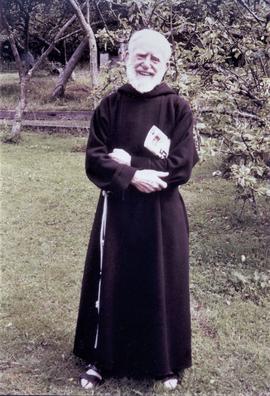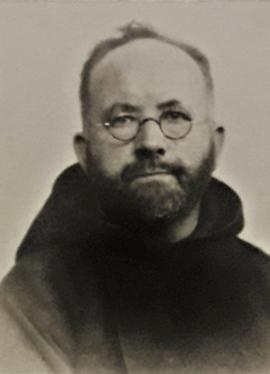Daniel McFadden was born in Belfast on 4 March 1901. He joined the Capuchin Franciscans in September 1918 and took Declan as his religious name. Following his theological studies, he was ordained to the priesthood in June 1927 and spent his first years in ministry in Holy Trinity Church in Cork. He was among the first friars to volunteer for the Irish Capuchin mission in Cape Town, South Africa (1929), and two years later (October 1931) in the newly established mission territory in Livingstone and Barotseland in Northern Rhodesia (now Zambia). He arrived in Barotseland in 1931 and immediately began to journey (on foot) to remote areas around Sesheke and further afield in Mongu in the western part of the country. Illness brought on by exposure to tropical diseases forced him to return to Ireland in April 1933. He once again volunteered for missionary work in the late 1930s and he made his way to the Archdiocese of Delhi-Simla in India. The Irish Capuchin friar, Fr. Sylvester Mulligan OFM Cap., had been appointed archbishop of this diocese in 1937. Fr. Declan remained in India for eleven years (1937-48). Following his return to Ireland, he was assigned to the Rochestown community in County Cork. Aside from a brief, three-year stint in Kilkenny, he remained in Rochestown for the rest of his life. His ministry included acting as spiritual director for the local Third Order of St. Francis confraternity, organising the church choir, and regular pastoral, preaching, confession, and mission duties. He died on 30 November 1979 and was buried in the cemetery attached to Rochestown Friary.
Baptismal name: Daniel McFadden
Religious name: Fr. Declan McFadden OFM Cap.
Date of birth: 4 Mar. 1901
Place of birth: Limestone Road, Belfast (Diocese of Down and Connor)
Name of father: Daniel McFadden
Name of mother: Mary Ann McFadden (née Burrell)
Date of reception into the Capuchin Order: 29 Sept. 1918
Date of first profession: 4 Oct. 1919
Date of final profession: 4 Oct. 1922
Date of ordination (as priest): 29 June 1927
Academic attainments: BA (1923)
Mission activities: Travelled to Cape Town, South Africa, and later Northern Rhodesia (now Zambia), in 1929. He returned to Ireland from Africa in 1933. He travelled to India in 1937. He returned to Ireland in 1948.
Date of Death: 30 Nov. 1979
Place of death: Cork
Place of burial: Cemetery, Rochestown Capuchin Friary, County Cork









